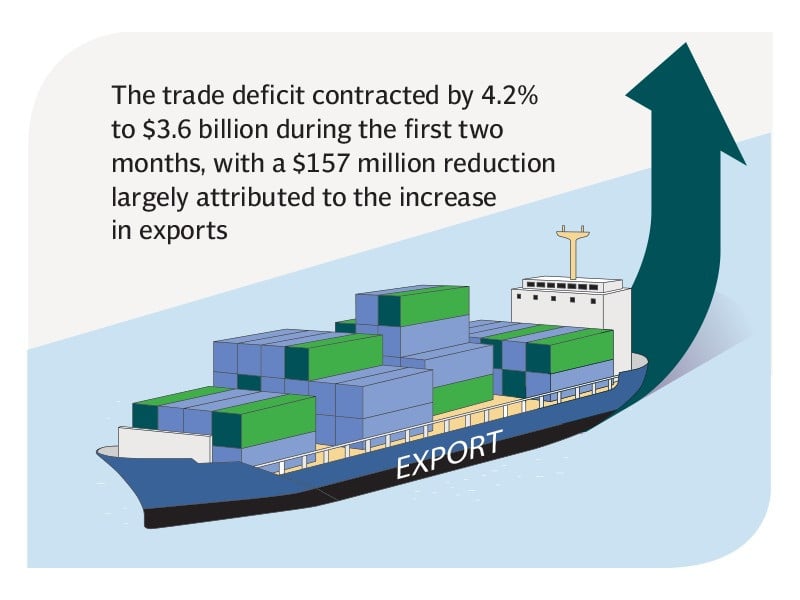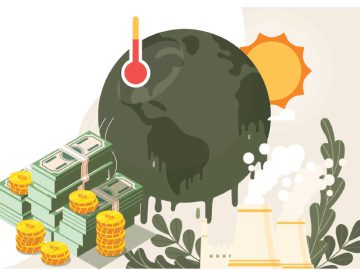ISLAMABAD:
Pakistan’s exports increased by double digits to $5.1 billion during the first two months of this fiscal year, helping to contain the trade deficit to $3.6 billion amid uncertainty over the timing of a new external bailout package.
Some argue that due to the overall deterioration in Pakistan’s economic, political, and security situation, even an IMF deal might not be of much help package.
The 14% growth in exports during the July-August period of the current fiscal year will partially offset the external sector pressures that may start building due to a lack of clarity on the International Monetary Fund (IMF) deal.
The Pakistan Bureau of Statistics reported on Tuesday that the nation’s merchandise exports remained at $5.1 billionan increase of $620 million, or 14%, over the same period last fiscal year.
Imports also grew by 5.7%, or $463 million, during the same period, with imports during the July-August period standing at $8.6 billion, according to the national data collecting agency. Consequently, the trade deficit contracted by 4.2% to $3.6 billion during the first two months, with a $157 million reduction largely attributed to the increase in exports.
Pakistan has been struggling to enhance its exports and is considering various measures. Last month, it finalised a trade-liberalisation plan to open up the economy by drastically reducing import taxes. The plan is expected to cost the treasury Rs476 billion over the medium term but aims to enhance the nation’s exports and economic growth.
Of the Rs476 billion estimated reduction in import taxes over five years, Rs282 billion is expected to occur during the IMF’s three-year programme period, according to these documents. The Federal Board of Revenue (FBR) has opposed the plan on the grounds that it would necessitate renegotiations with the IMF on revenue targets.
Prime Minister Shehbaz Sharif established the Tariff Rationalisation for Export-led Growth Committee in July to finalise recommendations for import duty rationalisation. The premier ordered the plan’s finalisation after industrialists complained about the high cost of doing business amid the government’s inability to provide any fiscal incentives due to IMF programme-related limitations.
There has been some improvement in Pakistan’s external non-debt-creating inflows in the past couple of months, which are much needed due to the lack of clarity on the IMF deal. The global lender has released its executive board calendar up to September 13th, and once again, Pakistan is not on the agenda.
In a televised speech on the state-run news channel, the finance minister on Tuesday did not give a timeline for the approval of the loan programme.
The PBS data showed that on a yearly basis, there was a one-fourth reduction in the trade deficit, which decreased to $1.7 billion in August compared to the same period last year. Exports amounted to $2.74 billion last monthan increase of $377 million, or 16%. However, imports only marginally contracted to $4.4 billion last month.
There was also a 12% reduction in the trade deficit on a monthly basis, amounting to $1.7 billion, due to a 19% increase in exports and only a 5% surge in imports. Compared to the $2.74 billion in monthly exports, imports stood at $4.4 billion last month.
Pakistan’s external debt-creating flows have not been picking up in the absence of the IMF umbrella. Until the global lender approves the $7 billion three-year programme, the government will have to manage the outflows to minimise pressure on foreign exchange reserves.
Some argue that due to the overall deterioration in Pakistan’s economic, political, and security situation, even an IMF deal might not be of much help. Despite the $3 billion last IMF programme, Pakistan could not secure loans from foreign commercial banks and capital markets, instead having to purchase over $6 billion from local markets to increase reserves.
The Economic Coordination Committee of the Cabinet last week approved a Rs4 per $100 incentive for foreign exchange companies as part of the government’s plan to raise foreign currency from local markets. These companies will earn an additional Rs4 benefit for every $100 sold to the central bank.
However, the shrinking trade deficit is causing concern at the FBR, which over the weekend blamed the Rs102 billion shortfall in its collection on declining imports. It noted that imports in the country declined by 2.2% in August 2024 compared to August 2023.
However, the PBS data showed that the decline in imports in August was 1.3% on an annual basis.
The FBR further stated that imports during August 2024, in PKR value, also showed a 7% decline compared to last August. Additionally, the import of high-duty items such as vehicles, home appliances, and miscellaneous consumer goods like garments, fabrics, and footwear has reduced significantly, altering the import mix. This trend has impacted the collection of customs duties as well as other taxes collected at the import stage, it added.





